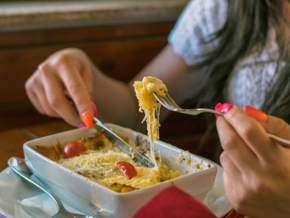
Laying a healthy foundation
Laying a healthy foundation
Good feeding habits can last a lifetime!
These tips can help you teach your toddler good eating habits that will stick with her for a lifetime:
- Mix it up . A balanced diet depends on a variety of foods from every food group every day—whole grains, fruit, vegetables, meat and beans and dairy. Also be sure to include foods with nutrients that your child may be lacking: Iron, Zinc, Iodine, Vitamin D, and fibre.
- Serve a rainbow of fruits and veggies. A variety of colourful foods expands your child’s tastes and provides a variety of nutrients for her tummy. Introducing new foods with old favourites may improve acceptance. For example, if she likes corn, try adding small red capsicum dices.
- Let your child decide how much to eat. Teach your child to respect her appetite by letting her decide what and how much to eat. If she’s hungry, let her eat heartily. But if she’s full, let her stop.
- Snack smart. Serve three small meals and two to three snacks a day. Because some toddlers get 25% of their kilojoules from snacks, make sure to offer nutritious choices for every snack. Avoid high-energy, low-nutrient foods, like chips, cookies and sugary drinks.
- Drink responsibly. Beverages are important for hydration, but too many of them can make your toddler too full to eat. Your toddler’s beverage choices should include water and pasteurized full cream cow’s milk. Limit milk to 2 cups per day. Avoid fruit juice and other sweetened drinks.
- Offer healthy fats. Young children need energy from fat for growth. Incorporate healthy sources of predominantly unsaturated fat – fatty fish, avocados, food made with vegetable oils – into your toddlers diet.
- Avoid adding salt. Even if you think your child’s food tastes too bland, remember that she doesn’t need all the salt that tastes right to you. Sodium also becomes a preferred taste once it’s introduced.
Related articles

Introducing Solids to Infants: Your Guide to Starting Solids
Starting solid foods is a new and exciting step in your baby’s development journey, but knowing where to start can be confusing. Let us help you master mealtimes!
11 mins to read

Postpartum Freezer Meals: Healthy Meal Prep Ideas for New Mums
By Marika Day, Accredited Practising Dietitian and Nutritionist with over a decade of experience in the areas of women’s health, gastrointestinal nutrition and disordered eating.
8 mins to read

Breastfeeding Snacks
Breastfeeding is a rewarding but demanding journey, and good nutrition is crucial for both you and your baby.
8 mins to read

Warming Baby Formula
There may not be many situations where you will need to warm up a formula feed, but on the odd occasion when you do it’s important to know how to do it safely.
2 mins to read

Formula For Newborn Babies
Baby formula is usually split up into two categories according to your babys age.
2 mins to read

Baby Formula Feeding Concerns
Most formula fed babies will be very happy on the baby formula you first choose. However, it’s important to know that not all formulas suit all babies.
7 mins to read

Special Baby Formulas
Formulas for lactose intolerance, regurgitation, and allergy management are some of the infant formulas available for formula fed babies with special dietary needs.
4 mins to read

How to Prepare Baby Formula
Safe preparation of baby formula is important for your baby’s health. Like any food preparation we need to consider good food hygiene practices - it doesn't need to be complicated.
5 mins to read

What Information Can Baby Formula Companies Provide?
Manufacturers and importers of infant formula, otherwise known as baby formula, may be bound to some very important codes of marketing and advertising.
2 mins to read

Guide to Baby Formula
Explore our guide to baby formula and learn more about the difference between newborn formula and stage 2 formula.
5 mins to read

Baby Formula Ingredients
Baby formulas will never be equal to breast milk, however they have been formulated to provide the necessary nutrients to support normal growth and development when breast milk is not available.&nb
4 mins to read

What Support is Available If I've Decided to Formula Feed
There are many parents out there just like you, who have for whatever reason, decided not to breastfeed, and given this is to be an unlikely easy decision, it’s important to know what support is th
2 mins to read

Transitioning Between Different Milk Feeding Options
Whether you’re moving from breastfeeding to formula feeding, or changing from one formula to another, it’s important to keep your eye out for signs of intolerance.
2 mins to read

Taste Tracker
Did you know? Many children are afraid of new foods, preferring to eat foods they are used to.
1 min to read

Breastfeeding Tips
In Australia, almost all mums intend to breastfeed. While breastfeeding is a natural way of feeding, it isn’t always easy.
4 mins to read

What is Baby Led Weaning?
Apart from the traditional 3 stage process of introducing solids, you may find other ways or methods to follow.
5 mins to read

Ready for finger-feeding?
At around 8 months old, your baby will be able to grasp and pick up small pieces of food.
2 mins to read

How To Start Complementary Feeding
Starting complementary feeding is an exciting (and messy) time! Here are our top tips on how and when to start baby food.
3 mins to read

Starting Solid Foods and Breastfeeding – The Perfect Combination
Your baby’s first spoonful of food marks an exciting and important milestone in their development.
4 mins to read